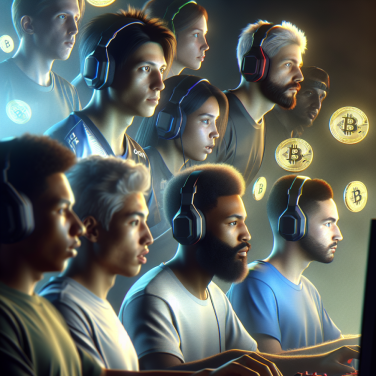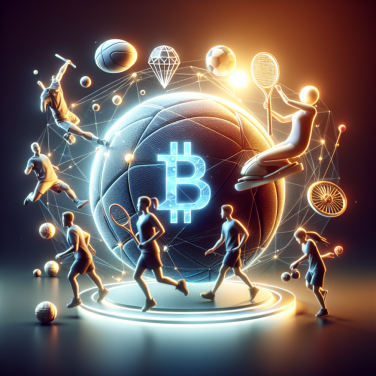Exploring the Impact of Athlete-Backed NFTs on the Sports Industry
The rise of athlete-backed Non-Fungible Tokens (NFTs) is transforming the relationship between fans and their sports heroes, as well as revolutionizing the sports memorabilia market. With NFTs, athletes are entering a digital arena where they can connect with fans on a personal level, while also capitalizing on their brand and on-court performances. These digital assets serve not only as collectibles but as a new medium for fan engagement and investment opportunities.
The hallmark of NFTs lies in their uniqueness and the proof of ownership afforded by blockchain technology. Unlike traditional trading cards or memorabilia, NFTs can take various forms, such as digital trading cards, video highlights, virtual game-worn gear, and even experiences such as meet-and-greets or game tickets. They cannot be replicated or forged, creating an authentic link between the athlete and the fan.
Athletes across basketball, football, soccer, and other sports are now launching their NFTs, appealing to a wide range of collectors and fans. By doing so, they are creating new revenue streams for themselves and their teams. These tokens typically include smart contracts that stipulate ongoing royalties from secondary sales, providing athletes with a potentially perpetual income source derived from their performance and popularity.
But the impact of athlete-backed NFTs extends beyond individual players. Teams and leagues are starting to explore the potential of these digital assets. NFT marketplaces and partnerships are being launched, enabling fans to trade and collect NFTs from a range of athletes and events within a single ecosystem. The NBA Top Shot is a prominent example, offering packs of NFTs that feature video highlights of memorable moments from basketball history, and whose sales have reached millions of dollars.
From a fan perspective, athlete-backed NFTs offer a new avenue of support and connection. The digital nature of NFTs eliminates many logistical issues associated with physical memorabilia, such as storage, authenticity verification, and deterioration over time. Additionally, these digital assets often come with unique experiences or perks, enhancing their value and the fan experience.
Critics, however, raise concerns about the environmental impact of NFTs due to the energy-intensive nature of blockchain transactions. There is also skepticism regarding the longevity and stability of the NFT market, with questions about what happens when the novelty wears off.
In the face of these concerns, the sports industry is actively looking for sustainable blockchain solutions and ways to stabilize the market.
Read also:
Conquering the Snow: A Guide to Nordic Skiing Mastery
With the dawn of the digital age, the world of sports has intersected with cutting-edge technology in unprecedented ways. Athletes across various disciplines are now tapping into the lucrative market of non-fungible tokens (NFTs), creating a new frontier for fan engagement and investment opportunities.
In the sports sector, NFTs are becoming a staple for individual athletes looking to build their brand beyond the field of play. These assets, often in the form of digital trading cards, videos, and exclusive experiences, provide a unique value proposition. Unlike traditional memorabilia, NFTs are backed by blockchain technology ensuring authenticity and providing a secure proof of ownership. This kind of digital collectible represents a paradigm shift in how fans connect with sports stars.
What's more, some of the world's most renowned athletes are joining the NFT bandwagon by launching their tokenized collectibles. From basketball legends to soccer superstars, these dominant figures in sports are leveraging their popularity to endorse NFTs that are tied to significant moments in their careers, personal artworks, or virtual meet-and-greets. These tokens are not just collector's items, but also serve as a new revenue stream, ensuring athletes benefit directly from sales and resales.
Highlighting the functional aspect, athlete-backed NFTs sometimes come with additional perks such as access to exclusive content, autographs, or even chances to attend real life events. This enhances the value for fans, feeding into their desire for personal connection with their sports heroes. Such innovations in fan engagement promote a sense of community and belonging, something sports fans fervently seek.
In addition to personal branding, NFTs are fostering a new community-driven model in sports merchandising. Digital collectibles can embody the spirit of the sport while letting fans claim a piece of the action. They also serve as a medium for athletes to express their creativity, comment on social issues, or even support charitable causes.
However, this new digital marketplace is not without its challenges. There's an increasing need for educating potential investors and enthusiasts about the risks and volatility associated with NFTs. The environmental impact of blockchain technology is another concern, sparking a dialogue over the need for sustainable alternatives in the crypto space.
But, despite the hurdles, it's clear that NFTs are revolutionizing the way athletes connect with their audience.
The Rise of Digital Collectibles: How Champions are Embracing NFT Technology
In the ever-evolving landscape of digital collectibles, professional athletes have begun to play a pioneering role by adopting non-fungible token (NFT) technology. Not only does this trend underscore the convergence of tech and sports, but it also grants fans unprecedented opportunities to own a piece of their favorite athletes' legacies.
One of the key aspects of this movement is the forging of a deeper connection between champions and their fanbase. Through NFTs, athletes are able to offer fans more than just game-worn jerseys or autographed balls. They can now sell digital assets such as exclusive video clips, virtual trading cards, or even moments from their career, each encoded with unique data that verifies its authenticity and ownership.
Athlete-backed tokens are not just a novel form of memorabilia; they are becoming an integral part of how athletes interact with the digital economy. They allow champions to control and monetize their brand directly without intermediaries. For instance, an athlete can issue a limited series of digital tokens commemorating a championship win, with each token providing access to special events, merchandise, or personal interactions.
This new market for digital collectibles has also expanded into virtual worlds. Athletes have started exploring partnerships with virtual reality platforms and video games, wherein their NFTs can be used as in-game items, avatars, or even unlock exclusive content. This not only heightens the value of the NFTs but also caters to a technologically savvy audience that spends a significant amount of time in digital environments.
From a financial perspective, NFTs have opened up new revenue streams for athletes. With the rise of blockchain technology, tokens can now be bought, sold, and traded on various marketplaces, often appreciating in value based on the athlete's performance and popularity. Additionally, smart contracts enable athletes to receive royalties automatically every time their NFT changes hands in the secondary market.
One of the challenges in this nascent industry, however, is the environmental impact associated with blockchain technology. Critics have raised concerns over the carbon footprint resulting from the energy-intensive process of "minting" NFTs. In response, many athletes and NFT platforms are seeking sustainable solutions, such as leveraging proof of stake blockchains, which are significantly less energy-intensive, or investing in renewable energy projects to offset emissions.




